介词
40个英语介词用法总结
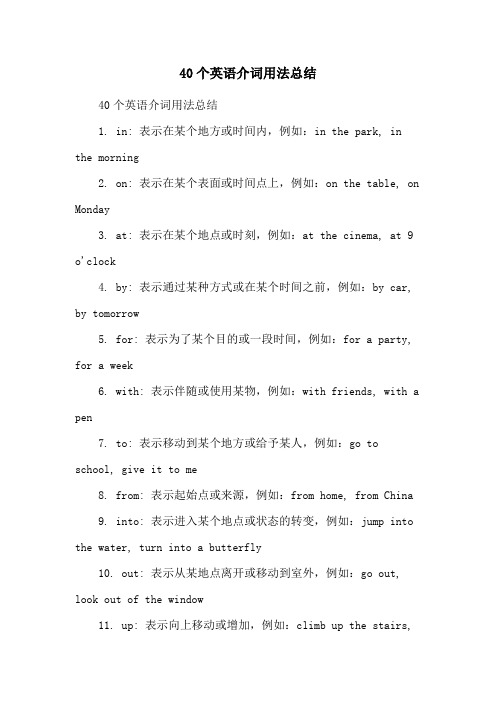
40个英语介词用法总结40个英语介词用法总结1. in: 表示在某个地方或时间内,例如:in the park, in the morning2. on: 表示在某个表面或时间点上,例如:on the table, on Monday3. at: 表示在某个地点或时刻,例如:at the cinema, at 9 o'clock4. by: 表示通过某种方式或在某个时间之前,例如:by car, by tomorrow5. for: 表示为了某个目的或一段时间,例如:for a party, for a week6. with: 表示伴随或使用某物,例如:with friends, with a pen7. to: 表示移动到某个地方或给予某人,例如:go to school, give it to me8. from: 表示起始点或来源,例如:from home, from China9. into: 表示进入某个地点或状态的转变,例如:jump into the water, turn into a butterfly10. out: 表示从某地点离开或移动到室外,例如:go out, look out of the window11. up: 表示向上移动或增加,例如:climb up the stairs,wake up12. down: 表示向下移动或减少,例如:walk down the hill, calm down13. about: 表示关于某事或在某个范围内,例如:talk about the movie, wander about the city14. off: 表示离开或关闭,例如:get off the bus, turnoff the lights15. on: 表示打开或激活,例如:turn on the TV, switch on the computer16. over: 表示越过或在某地上方,例如:jump over the fence, fly over the city17. under: 表示在某物下面或被控制或影响,例如:hide under the bed, live under his rules18. with: 表示具有某种特征或和某人一起做某事,例如:a man with blue eyes, dance with me19. without: 表示没有某物或在缺乏某物的情况下,例如:go without food, live without regret20. by: 表示通过某种方式,例如:learn by doing, go by bus21. through: 表示穿过某物或完成某事,例如:walk through the door, go through the documents22. across: 表示横穿某物或在某个范围内,例如:swimacross the river, all across the world23. between: 表示在两个事物之间或在某个时间段,例如:choose between two options, between 9 and 10 o'clock24. among: 表示在三个或三个以上事物之间或在某群人中,例如:share among friends, discuss among colleagues25. around: 表示在周围或在某个时间点附近,例如:walk around the park, around midnight26. through: 表示通过某事物或在某段时间内,例如:read through the book, work through the night27. against: 表示反对或靠在某物上,例如:fight against injustice, lean against the wall28. for: 表示代表或支持某人或某事,例如:vote for a candidate, fight for freedom29. towards: 表示朝向某个方向或对某人有好感,例如:walk towards the beach, feel towards someone30. within: 表示在某个时间或范围内,例如:arrive within an hour, within the city limits31. beyond: 表示超出某个界限或超过某个程度,例如:beyond expectations, beyond the horizon32. along: 表示沿着某个路线或伴随某人一起,例如:walk along the street, sing along with the song33. above: 表示在某物之上或高于某个程度,例如:flyabove the clouds, above average34. below: 表示在某物之下或低于某个程度,例如:swim below the surface, below freezing35. beside: 表示在某物旁边或和某人一起,例如:sit beside me, beside the lake36. near: 表示在某物附近或接近某个时间,例如:live near the beach, near the end37. past: 表示经过某个地点或在某个时间之后,例如:walk past the store, past midnight38. around: 表示在周围或大约某个数量,例如:look around the room, around 20 people39. after: 表示在某个时间之后或追求某人或某事,例如:after dinner, run after the dog40. before: 表示在某个时间之前或在某个事件之前,例如:before sunrise, before the meeting这些介词是英语中常用的一些基本介词,它们在表达地点、时间、方式等方面起到了重要的作用。
常见的介词大全
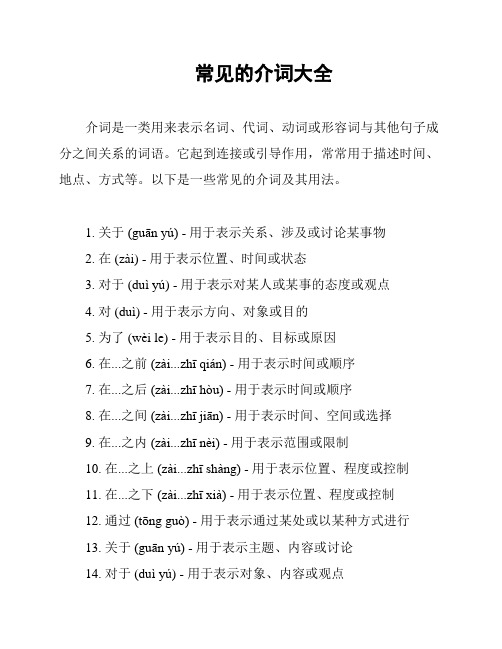
常见的介词大全介词是一类用来表示名词、代词、动词或形容词与其他句子成分之间关系的词语。
它起到连接或引导作用,常常用于描述时间、地点、方式等。
以下是一些常见的介词及其用法。
1. 关于(guān yú) - 用于表示关系、涉及或讨论某事物2. 在 (zài) - 用于表示位置、时间或状态3. 对于 (duì yú) - 用于表示对某人或某事的态度或观点4. 对 (duì) - 用于表示方向、对象或目的5. 为了 (wèi le) - 用于表示目的、目标或原因6. 在...之前(zài...zhī qián) - 用于表示时间或顺序7. 在...之后(zài...zhī hòu) - 用于表示时间或顺序8. 在...之间(zài...zhī jiān) - 用于表示时间、空间或选择9. 在...之内(zài...zhī nèi) - 用于表示范围或限制10. 在...之上(zài...zhī shàng) - 用于表示位置、程度或控制11. 在...之下(zài...zhī xià) - 用于表示位置、程度或控制12. 通过(tōng guò) - 用于表示通过某处或以某种方式进行13. 关于(guān yú) - 用于表示主题、内容或讨论14. 对于 (duì yú) - 用于表示对象、内容或观点15. 针对(zhēn duì) - 用于表示目标或针对特定情况16. 根据(gēn jù) - 用于表示依据、基础或原因17. 按照 (àn zhào) - 用于表示照着顺序、方法或规则18. 跟随(gēn suí) - 用于表示后继或紧随19. 靠近 (kào jìn) - 用于表示接近或附近20. 近 (jìn) - 用于表示时间、距离或关系请注意,以上只是一些常见的介词,还有许多其他介词可根据具体语境来使用。
常见介词30个

常见介词30个
1、简单介词包括in,on,with,by,for,at,about,under,of,to等。
(to为介词,意为“习惯(做)……”,后接名词,代词或动名词形式)
2、合成介词包括into,within,throughout,inside,outside,without 等由两个单词组成的介词。
3、重叠介词包括fromamong从...当中frombehind从...后面,untilafter 直至...之后,atabout在大约...,afterabout在大约...之后等。
4、短语介词一个或两个简单介词和一个或几个其他词类构成一个短语,作用相当于一个介词,这就叫做短语介词。
这类介词的末尾总是一个简单介词。
如accordingto,becauseof,bymeansof,inadditionto,infrontof,inspiteof,into等。
5、分词介词有极少数介词的词尾是“-ing”,形似现在分词(其中也有些可做分词)。
常用的有:considering,regarding,respecting,including。
介词
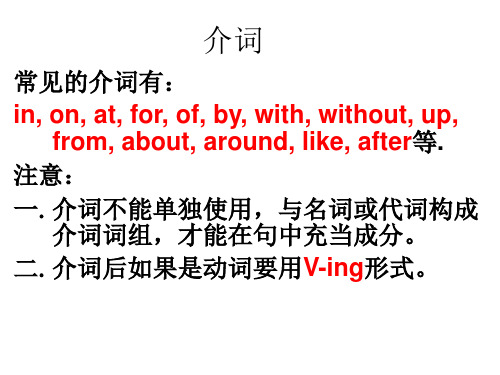
三. 表示方位的介词 二)over, under, above, below的区别 1. over “在…正上方(垂直)”,也可以指 覆盖,“在…上面”,反义词是under. eg: There is a bridge over the river. 2. under “在…正下方(垂直)” 。 eg:The cat is sleeping under the table. 3. above“在…的下面,低于…”,不一定垂 直,反义词是below。
except, except for
except 同类中“除了。。。之外” except for 非同类中“除了。。。之外” (整体肯定,局部修正) The shop is open everyday except Sunday. He is a handsome guy except for a little fat. Your writing is good except for a few grammar.
七.固定搭配的介词短语 四)动词+形容词+介词 be afraid of, be angry with, be able to, be good at, be good for, be proud of, be famous for, be late for, be full of, be filled with, be interested in, be pleased with, be different from, est.
二)after, in 的区别 1. in +一段时间,表示将来的一段时间之后, 用于将来时。 2. After+一段时间 表示过去的一段时间之后, 用于过去时。 如果after 后跟将来的某一个时刻,也可 以用于将来时。 in eg:He will come back_____a week. after a week. He came back ____ after 5 o’clock. He will come back _____
介词大全
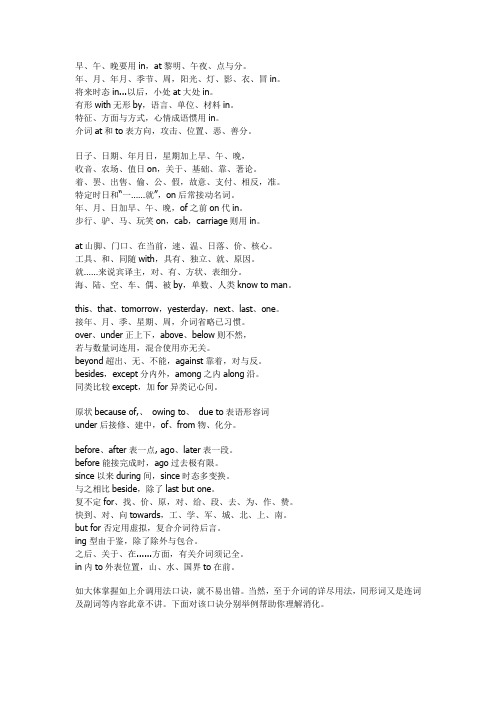
早、午、晚要用in,at黎明、午夜、点与分。
年、月、年月、季节、周,阳光、灯、影、衣、冒in。
将来时态in...以后,小处at大处in。
有形with无形by,语言、单位、材料in。
特征、方面与方式,心情成语惯用in。
介词at和to表方向,攻击、位置、恶、善分。
日子、日期、年月日,星期加上早、午、晚,收音、农场、值日on,关于、基础、靠、著论。
着、罢、出售、偷、公、假,故意、支付、相反,准。
特定时日和“一……就”,on后常接动名词。
年、月、日加早、午、晚,of之前on代in。
步行、驴、马、玩笑on,cab,carriage则用in。
at山脚、门口、在当前,速、温、日落、价、核心。
工具、和、同随with,具有、独立、就、原因。
就……来说宾译主,对、有、方状、表细分。
海、陆、空、车、偶、被by,单数、人类know to man。
this、that、tomorrow,yesterday,next、last、one。
接年、月、季、星期、周,介词省略已习惯。
over、under正上下,above、below则不然,若与数量词连用,混合使用亦无关。
beyond超出、无、不能,against靠着,对与反。
besides,except分内外,among之内along沿。
同类比较except,加for异类记心间。
原状because of,、owing to、due to表语形容词under后接修、建中,of、from物、化分。
before、after表一点, ago、later表一段。
before能接完成时,ago过去极有限。
since以来during间,since时态多变换。
与之相比beside,除了last but one。
复不定for、找、价、原,对、给、段、去、为、作、赞。
快到、对、向towards,工、学、军、城、北、上、南。
but for否定用虚拟,复合介词待后言。
ing型由于鉴,除了除外与包合。
之后、关于、在......方面,有关介词须记全。
介词大全
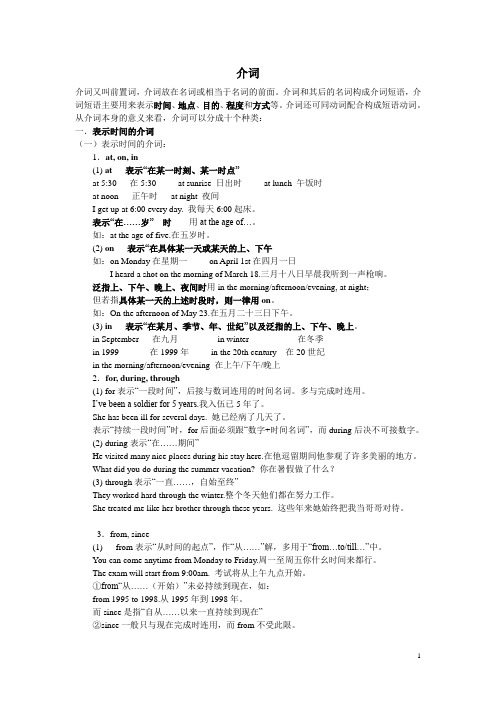
介词介词又叫前置词,介词放在名词或相当于名词的前面。
介词和其后的名词构成介词短语,介词短语主要用来表示时间、地点、目的、程度和方式等。
介词还可同动词配合构成短语动词。
从介词本身的意义来看,介词可以分成十个种类:一.表示时间的介词(一)表示时间的介词:1.at, on, in(1) at 表示“在某一时刻、某一时点”at 5:30在5:30at sunrise 日出时at lunch 午饭时at noon正午时at night 夜间I get up at 6:00 every day. 我每天6:00起床。
表示“在……岁”时用at the age of…。
如:at the age of five.在五岁时。
(2) on 表示“在具体某一天或某天的上、下午如:on Monday在星期一on April 1st在四月一日I heard a shot on the morning of March 18.三月十八日早晨我听到一声枪响。
泛指上、下午、晚上、夜间时用in the morning/afternoon/evening, at night;但若指具体某一天的上述时段时,则一律用on。
如:On the afternoon of May 23.在五月二十三日下午。
(3) in 表示“在某月、季节、年、世纪”以及泛指的上、下午、晚上。
in September在九月in winter在冬季in 1999 在1999年in the 20th century在20世纪in the morning/afternoon/evening 在上午/下午/晚上2.for, during, through(1) for表示“一段时间”,后接与数词连用的时间名词。
多与完成时连用。
I’ve been a soldier for 5 years.我入伍已5年了。
She has been ill for several days. 她已经病了几天了。
(完整版)汉语介词分类
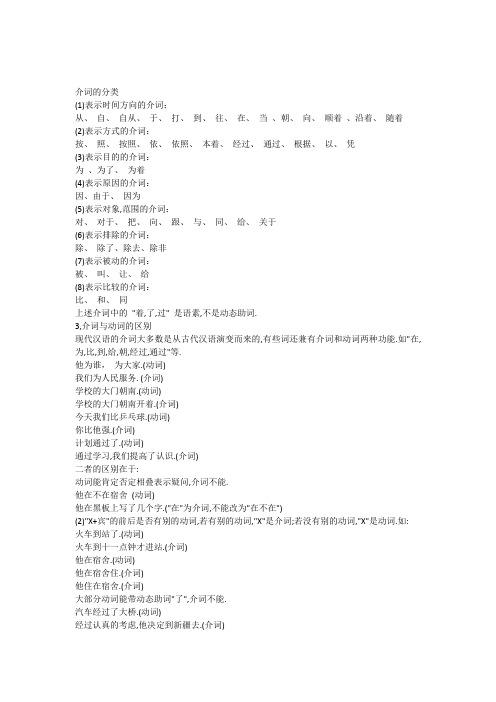
介词的分类(1)表示时间方向的介词:从、自、自从、于、打、到、往、在、当、朝、向、顺着、沿着、随着(2)表示方式的介词:按、照、按照、依、依照、本着、经过、通过、根据、以、凭(3)表示目的的介词:为、为了、为着(4)表示原因的介词:因、由于、因为(5)表示对象,范围的介词:对、对于、把、向、跟、与、同、给、关于(6)表示排除的介词:除、除了、除去、除非(7)表示被动的介词:被、叫、让、给(8)表示比较的介词:比、和、同上述介词中的"着,了,过" 是语素,不是动态助词.3,介词与动词的区别现代汉语的介词大多数是从古代汉语演变而来的,有些词还兼有介词和动词两种功能.如"在,为,比,到,给,朝,经过,通过"等.他为谁,为大家.(动词)我们为人民服务. (介词)学校的大门朝南.(动词)学校的大门朝南开着.(介词)今天我们比乒乓球.(动词)你比他强.(介词)计划通过了.(动词)通过学习,我们提高了认识.(介词)二者的区别在于:动词能肯定否定相叠表示疑问,介词不能.他在不在宿舍(动词)他在黑板上写了几个字.("在"为介词,不能改为"在不在")(2)"X+宾"的前后是否有别的动词,若有别的动词,"X"是介词;若没有别的动词,"X"是动词.如:火车到站了.(动词)火车到十一点钟才进站.(介词)他在宿舍.(动词)他在宿舍住.(介词)他住在宿舍.(介词)大部分动词能带动态助词"了",介词不能.汽车经过了大桥.(动词)经过认真的考虑,他决定到新疆去.(介词)他给了我一本书.(动词)他给我买了一本书.(介词)简单的说,介词就介绍对象和句子其他部分的关系的。
比如:在,和,跟,从,除了,为了,关于,根据……等等现代汉语-副词的种类副词常修饰、限制动词或形容词性词语,表示程度、范围、时间等意义:程度副词:很、最、极、挺、太、非常、非常、十分、极其、格外、分外、更、更加、越、越发、有点儿、稍、稍微、略微、几乎、过于、尤其过分等;范围副词:都、总、共、总共、统统、只、仅、仅仅、单单、净、光、一齐、一律、就;时间、频率副词:已、已经、曾、曾经、刚、才、、刚刚、正、在、正在、将、将要、就、就要、马上、立刻、顿时、终于、常、常常、时常、时时、往往、渐渐、早晚、从来、一向、向来、总是、始终、永、赶紧、仍然、还是、屡次、依然、重新、还、再、再三、偶尔处所副词:四处、随处肯定、否定副词:必、必须、必定、准、的确,不、没有、没、未、别、莫、勿,是否、不必、不用(甭)、不曾情态、方式副词:大肆、肆意、特意、猛然、忽然、公然、连忙、赶紧、悄悄、暗暗、大力、稳步、阔步、单独语气副词:难道、岂、究竟、偏偏、索性、简直、就、可、也许、难怪、大约、幸而、幸亏、反倒、反正、果然、居然、竟然、何尝、何必、明明、恰恰、未免、只好、不妨重复副词:又、再、还、仍等。
介词大全简版

介词大全◆ 1.about◆ 2.above(与below相反)◆ 3. across◆ 4.after 在…后(与before, behind相反)◆ 5.against◆ 5. along 沿着,顺着◆ 6.among在…当中◆7.around◆8.as作为◆9.at◆10. before(与after相反)◆11.behind在…的后面(与after不同,只能表位置,不能表示时间.)◆12.below在…的下面,低下地(与above 相反)◆13.beside 在...的旁边◆14.besides 除…外(还…)◆15.between在...二者之间◆16.beyond l) 在那一边2) 超过能力范围◆17.but 除去(=except)◆18.by 1) 被(常用于被动结构,后接动作的执行者)2) 在...的近旁3) 在...之前,不迟于4) 从旁经过,路过[注]by后跟名词表示交通工具◆19.down沿...而下◆20.during 在...时期当中◆21.except 除...外(指例外,与besides不同)◆22.for 1) 为2) 对...而言3)经历,经过(指时间和距离)4) 向5) 由于7) 交换8) 赞成9) 对10)虽然,尽管=in spite of I stick to my option for all that. 尽管如此,我还是坚持我的意见。
For all his shortcoming he is a good man. 他尽管有缺点,仍是个好人。
◆23.from◆24.in◆25.inside◆26.into◆27.like◆28.near◆29.of◆30.off◆31.on◆32.out of◆33.outside◆34.over◆35.past◆36.round◆37.since◆38.through◆39.throughout 完完全全,始终,到处◆40.till 直到…◆41.to◆42.toward(s) 向,对,近◆43.under 在◆44.until 直到…为止◆45.up◆46.upon◆47.with◆48.within◆49.without。
- 1、下载文档前请自行甄别文档内容的完整性,平台不提供额外的编辑、内容补充、找答案等附加服务。
- 2、"仅部分预览"的文档,不可在线预览部分如存在完整性等问题,可反馈申请退款(可完整预览的文档不适用该条件!)。
- 3、如文档侵犯您的权益,请联系客服反馈,我们会尽快为您处理(人工客服工作时间:9:00-18:30)。
初中英语语法/介词一.选择最佳答案(表示时间关系的介词).1.Theplane arrived at London airport ______ Wednesday.A. onB. atC. inD. for2.What do you usually do ________ Christmas?A. onB. atC. inD. for3.Mrs Brown worded in the west of Australia ________ last summer?A. /B. onC. inD. since4.The first class begins ___ 8 o’clock __ the morning.A. at/onB. at/inC. on /inD. on/on5._______the past two months he has been busy with his school work.A. ForB. OnC. SinceD. At6.________last Saturday, we had had two football matches with Class Two.A. ForB. /C. ByD. During7.We will be in Nanjing _____Tuesday____Thursday.A. on/ throughB. on/toC. from/toD. on./till8.Mr Black will visit our new school building __ two days.A. beforeB. afterC. atD. in9._______ the end of last spring Wang Hai joined the army _______ the end.A. At/atB. By/inC. In /atD. At /in10.We will have a football match _____ this Saturday afternoon..A. onB. /C. inD. for11.He came to see you _____ the evening of May 10th.A. inB. atC. onD. for12.I’m afraid I gave you a lot of trouble ________ my stay here.A. inB. forC. duringD. on13.The singing group will have two performances ______ October.A. afterB. sinceC. /D. for14.The supermarket is open ______ midnight.C. tillD. /15.She didn’t go to work ______ that morning. She slept ______ noon.A. /…tillB. on…tillC. at…atD. /…at16.He was ill _____ a week, and _______ the week he ate almost nothing .A. for/atB. for/duringC. during/duringD. for/for17.Days are longer ______ summer than __winter.A. in/inB. in/onC. from/toD. to/in18.Children get presents ___Christmas and _their birthday. Granny is coming for lunch__ Christmas day.A. at/on/onB. on/on/onC. at/in/atD. in/on/in19.________ New Year’s eve people usually don’t go to bed until midnight.A.AtB.OnC. ForD. In20.Tom and Paul usually watch TV __ weekends.A. atB. inC. forD. /21.Every day the old man takes these children home _____ school.A. atB. toC. fromD. after22.Could you come to my office ________ the day after tomorrow.A./B. onC. inD. at23.We had built three bridges over the river _______ the end of 1994.A. atB. onC. forD. by24.Life will be better _____ the 21st century.A. atB. onC. forD. in25.Do you often work late _____ night.A. atB. inC. forD. during二.选择最佳答案(表示地点运动方向的介词).1.I ha d a new card, and I didn’t write ________.A. on itB. itC. in itD. above it2.There is a bridge ________ the river.A. underB. overC. onD. next3.He said that he would meet us ____ the cinema.A. inB. atC. onD. in4.There is a book store________ the street corner.A. atB. inC. onD. by5.From the top of the teaching building we saw the lake ________ us.A. underB. overC. belowD. above6.There are many beautiful birds ______ the tree.A. onB. atC. inD. besides7.It was written _______ page 20.A. atB. inC. onD. above8.My house is _____ the two buildings, so we get little sunshine during the day.A. betweenB. amongC. inD. at9.Lucy is waiting _____ No.3 bus stop ________ her father.A. for/forB. for/atC. at/forD. at/at10.Don’t talk so loud ________ table.A. byB. onC. atD. beside11.Is there anything interesting ________ today’s newspaper?A. inB. onC. atD. /12.Cars and buses travel _________ the road to the town.A. onB. alongC. inD. by13.Can you tell me who spoke ________ the meeting ?A. atB. alongC. inD. for14.My uncle lives ______ 208 Smith Street.A. atB. onC. toD. with15.At last we reaches the village ______ the hill.A. at the foot ofB. at footC. on foot ofD. in the foot from16.Shanghai is _______ the east of China and Japan is _______the east of China.A. to/toB. to /inC. in /toD. in /in17.________ the end of the street you can find the post office.A. ByB. AtC. OnD. In18.Do you often listen ________the programmes ________ the radio.A. to/ofB. to /inC. to/onD. on /to19.Please w ait ________the office . Don’t come in until you are called.A. inB. intoC. insideD. outside20.Are you going to leave Guangzhou __________ Beijing?A. forB. toC. fromD. in21.The whale has a nose _______ the top of its head.A. atB. aboveC. overD. on22.You must go _____ the bridge and then you will see the bank _________ the left.A. over/onB. to /byC. to/onD. over/at23.There is a hole _______ the wall.A. inB. atC. forD. towards24.Can you tell me the way ______ Shanghai Zoo?A. toB. atC. forD. towards25.Bill kicked the ball too hard , and it went ________ the street ________ one of Mr. Smith’s windows.A. across/onB. through./onC. across/throughD. to / through三.选择最佳答案(注意与一些动词搭配使用的介词)1.Thank you _______ your coming.A. toB. ofC. byD. for2.He spent a long time ______ the maths problem.A. inB. onC. forD. at3.Mr Li is going to help him ________ his Chinese this afternoon.A. withB. onC. byD. at4.How much did you pay ________ this book?A. forB. atC. onD. with5.Please translate the sentence ______ English.A. intoB. toC. atD. for6.The price of the computer has been reduced________ 5%.A. offB. toC. byD. about7.Please fill the bottle_______ tea.8.The machines cut big pieces of metal ____small pieces.A. inB. byC. toD. into9.Billy works hard at school and his teachers often praise him________ his hard work.A. withB. atC. onD. for10.You must apologize _________ her for your rudeness.A. toB. atC. onD. with11.I got angry and I threw a stone _______him.A. toB. towardsC. atD. for12.You can borrow the book ________ your school library.A. fromB. toC. forD. at13.I prefer coffee___ tea.A. overB. toC. forD. than14.Would you show me ________ your factory?A. toB. inC. atD. round15.Don’t catch me ________ the arm. I have nothing to do ______the matter.A. by/withB. on/withC. by/onD. on/on16.Help yourself_______ some fish. It tastes very nice.A. withB. onC. inD. to17.Bill must deliver the newspapers________ people’s houses_________ all kinds ofweather.A. to/inB. at/inC. for/forD. to/for18.Theyhaven’tdecided________ the date for the next meeting.A. forB. byC. inD. on19.Let me introduce her _______ you.A. withB. onC. toD. for20.Li Ling fell _____ his bicycle this morningA. onB. downC. offD. to21.I s houted______ her, but shi didn’t hear me.22.Tom has made friends_____ many Chinese students.A. withB. toC. byD. among23.After school, I often learn singing and dancing _______ hobbies.A. /B. onC. inD. for24.LI Ming fell ill this morning, so he asked _______ leave.A. fromB. forC. onD. in25.I saw the man hit the boy _______ the face.A. inB. onC. towardD. by四.选择最佳答案(注意介词的习惯用法)1.Mr Li, shall I write _____ ink?A. byB. ofC. inD. with2.Can you find out the answer_____ these questions?A. ofB. forC. toD. with3.__________ his help, I passed the English test yesterday.A. UnderB. OfC. WithD. by4.Don’t forget to bring your text book ______ you.A. in B after C. with D. to5.The people are waiting ____ the bus, and they ate standing ____ line.A. for/onB. for/inC. at /onD. at/in6.Can you sing this song _____ English?A. withB. inC. byD. for7.Who is the boy _____ blue trousers?A. inB. onC. withD. at8.He decided to get some medicine_______ his cold.A. toB. ofC. onD. for9.The baby’s sleeping. Don’t speak_______ such a loud voice.A. withB. inC. onD. at10.The old woman over there is blind _______ both eyes.A. onB. withC. forD. in11.China is a large country _______ a long history.A. forB. inC. byD. with12.We can’t live even for a few minute s______ air.A. inB. withoutC. byD. with13.The soldiers are standing__________ a row.A. inB. onC. byD. with14.She always serves her customers _______ a smile.A. inB. withC. byD. on15.Don’t read _____ the sun. It’s bad _________ your eyes.A. under/ofB. in/towardsC. in/ forD. under/for16.How many students go to school _____ foot?A. byB. inC. onD. withe here, and I want to have a word _______ you.A. withB. forC. toD. on18._______ his great surprise, the experiment has turned out a success.A. InB. ToC. WithD. At19.The girl______ dark hair and bright eyes is LiLi.A. withB. inC. onD. by20.I heard the song_______ the radio. If you want to learn it, you may watch the MTV _______ Channel 8 tonight.A. in; onB. on; onC. on; atD. in; in21.I saw the great changes ________ my own eyes.A. inB. byC. onD. with22.You can cook a fish______ many ways.A. inB. byC. withD. for23.I like the cross talk ________ Class Two best.A. inB. byC. forD. /24.You can see taxis ___________ different colours and sizes in big cities.A. ofB. withC. forD. /25.Fangfang, here is a letter ______ you. It’s ________ your brother.A. from/ toB. for/ toC. for/fromD. for/for26. There will be an English film ____ the evening of September the first.A. inB. atC. onD. /27.Reading-room won’t open ____ half past nine.C. forD. during28.Does John know any other foreign language ____ French?A. exceptB. butC. besidesD. beside29.Go ____ the gate and you’ll find the entrance ____ the park ____ the other side.A. through, to, onB. along, of, onC. down, to, atD. up, of, by30.One ____ five will have the chance to join in the game.A. withinB. amongC. inD. from31.They will provide us ____ eggs and meat.A. onB. toC. withD. by32. He took the youth ____ long hair ____ a girl.A. in, asB. with, asC. with, forD. in, fo。
